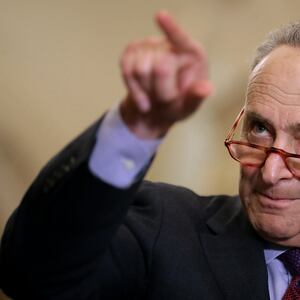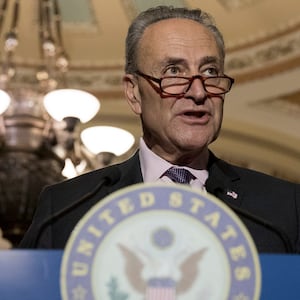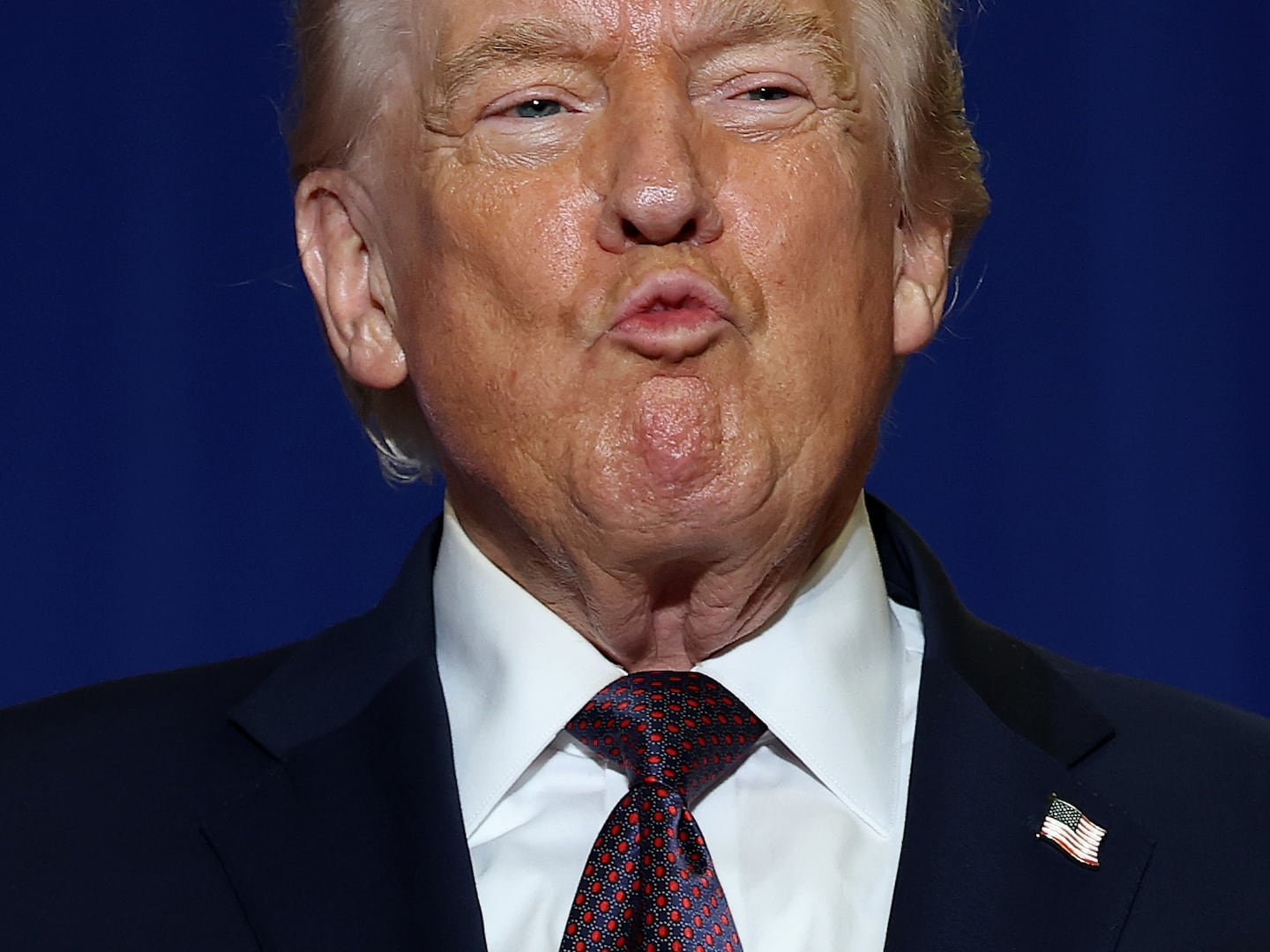As the leader of the U.S. Senate, Chuck Schumer quite literally has 99 problems. But the New York Democrat has managed to completely eliminate one: a primary challenge in his home state this year.
Even before he took the reins as Senate majority leader last January, Schumer was stalked by chatter that a prominent progressive New Yorker might run against him in 2022. And Democrats’ disappointment with Schumer’s Senate has only grown as the party’s agenda on everything from climate change to voting rights dies a slow and painful death in the chamber.
Furious Democrats, especially in progressive hubs like New York, haven’t been in the mood to let their leaders off the hook. But when it comes to Schumer, a funny thing happened: There may not be a worse time to be him in Washington—or a better time to be him in New York.
With the primary six months away, Schumer is cruising to a fifth term without so much as a symbolic challenge. It’s not an accident.
Even while he’s been consumed with the Democratic agenda in Washington, Schumer has been almost impossible to escape in New York. He has crashed Brooklyn stoop parties on his bike, ridden along with striking taxi cab drivers, rallied for bike delivery workers, and Merengue’d with the city’s Puerto Rican political elite in San Juan. During the pandemic, he has constantly popped up, New Yorkers say, on the most obscure of Zoom meetings.
It’s all vintage Schumer, whose appetite and aptitude for flooding the zone in New York borders on the legendary and, sometimes, the absurd. Many longtime observers believe he’s somehow found a new gear back home.
“Chuck defies the laws of political gravity,” said Rep. Ritchie Torres (D-N.Y.). “Even as he’s risen to Majority Leader, he’s become more visible locally than ever before.”
A distant incumbent is a common ingredient for a successful primary. That was never going to be Schumer. But in parsing the senator’s frenetic schedule, a newer trend is clear: A heightened strategic outreach to the left-wing constituencies that would be most inclined to support a primary challenge.
Schumer’s charm offensive—which has entailed not just personal engagement with lefty organizers but also intentional high-profile work on key progressive issues—has not only foreclosed the threat of a primary challenge but brought the rumor mill screeching to a halt.
It’s gotten to the point where there is a running joke now in left-wing political circles in New York: For members of the Democratic Socialists of America, Schumer is easier to get a hold of than Rep. Alexandria Ocasio-Cortez.
Ocasio-Cortez is a card-carrying DSA member and, coincidentally, the most high-profile New Yorker mentioned as a possible Schumer challenger. Schumer, meanwhile, is still thought of in those corners as a classic Wall Street Democrat.
But now, he’s one that lefties can live with. Asked about the joke, Jeremy Cohan, the co-chair of DSA’s chapter in New York City, acknowledged it and laughed.
“He’s really good at retail politics,” Cohan said of Schumer. “He has reached out and supported NYC-DSA legislators, and their causes, in a way that someone like Gov. [Andrew] Cuomo just couldn’t imagine doing.”
In New York politics, it was never really accepted that Schumer was at risk of losing—or even having to run a real primary campaign. No credible candidate ever seriously tested the waters for a campaign, several sources said, though some certainly thought about it.
In an interview with CNN published Wednesday, Schumer said that “when it comes to reelection, I work really hard for New York and it always works out fine… I always am looking forward, not over my shoulder.”
Asked to comment on Schumer’s approach to the primary threat, and his outreach to the left, campaign spokesman Angelo Roefaro claimed that the senator’s activities would be no different were he not up for reelection.
What defines Schumer is that “he finds a way to be everywhere, particularly when it counts, and especially in crisis,” said Roefaro. “Chuck is ready, energized and excited to work every day for this great state and nation.”
But to many, it’s indisputable that Schumer—who has won every race he has ever run in, dating to 1974—operated as if he was in danger, and adjusted accordingly. Few believe he’d be locking arms with left-wing upstarts like the Sunrise Movement and courting DSA members otherwise.
“He is really, like, astoundingly present,” said Sean McElwee, the founder of Data For Progress, the polling and strategy shop founded in New York. “He shows up in random places, does tons of Zooms for local community groups, he really talks a lot to progressive organizations.”
And a Democratic operative who knows Schumer said “he has been more deliberate, more available, and more willing to give up the hours in his day to progressives.”
It’s not just that Schumer has ceded virtually no room to his left, however. Even as the Senate has become a graveyard of liberal priorities, he has continued to sharpen his appeal to a broader electorate, making a primary challenge even more unappealing.
The trillion-dollar Infrastructure Investment and Jobs Act, brokered by a bipartisan group in the Senate, represents a rare investment in New York’s crumbling roads and transit systems. Schumer has relentlessly sold its impacts in the Empire State, along with the $1.9 trillion American Rescue Plan relief bill that passed last year.
“No one is going to agree with everything he does—that's just politics today,” said Meredith Kelly, a Democratic strategist who got her start working for Schumer in New York. But she argued that when most New York voters hear from Schumer, it’s about tangible things that positively impact their lives.
“His formula works,” Kelly said. “Getting shit done for people.”
Everyone in New York, seemingly, has their Schumer story. Torres, a freshman congressman from The Bronx, told The Daily Beast that he recently called a member of a community council in his district to find a time to brief them on local impacts of the just-passed infrastructure bill. No need, the person told him. Schumer already had.
“I was floored,” Torres said. “I think Chuck’s heightened visibility is meant to send a message that he has never forgotten where he comes from.”
Some Democrats reject the notion—largely advanced by Republicans seeking to needle the Majority Leader—that Schumer has steered the Senate agenda to the left explicitly to protect himself from a primary. That snark hit its peak after Schumer held a doomed vote last month on changing Senate rules to pass voting rights legislation, which attracted criticism from some Democrats for exposing vulnerable senators to a tough vote.
Matt House, Schumer’s former communications director, said his old boss’ high-stakes strategy to pressure Sens. Joe Manchin (D-WV) and Kyrsten Sinema (D-AZ) to embrace filibuster changes was not dictated by the demands of reelection, but by a number of factors. “He’d end up in the same place strategically every time,” House said.
The progressive New Yorkers who spent the last year loudly and visibly protesting Schumer to take those very steps have a hard time seeing it that way, however. Liat Olenick, a Brooklyn activist and elementary school teacher, said their impact on Schumer’s decisions in the Senate was obvious. “That’s how primaries work,” she said.
Progressives see plenty of other evidence in Schumer’s policy record and political strategy that he was taking a primary threat very seriously.
Schumer has, for instance, been perhaps the most powerful elected Democrat pushing Biden to cancel student loan debt. In the process, he’s partnered with up-and-coming New York progressives, like Reps. Torres, Mondaire Jones, and Jamaal Bowman—who himself had just ousted a longtime incumbent in a primary. At a December 2020 press conference on the issue, Schumer beamed Bowman to the podium via his iPad.
In New York, Schumer has been a high-profile advocate for the most of-the-moment causes of the left. He was crucial in brokering a deal to provide relief to indebted cabbies, and then dramatically elevated the struggle of bicycle delivery workers, riding on his bike alongside organizers in October as he vowed to help secure them resources. When Schumer rallied with Ocasio-Cortez in Times Square in January on behalf of the delivery workers, it was not the first time the two appeared jointly back home in the last year.
In October, Schumer endorsed India Walton, a Democratic Socialist, as mayor of Buffalo—breaking with the chair of the New York Democratic Party, who declined to endorse, comparing Walton to former KKK leader David Duke.
Some of Schumer’s most vocal critics are the same people he has been most conspicuous about cultivating. In 2019, the climate advocacy group Sunrise Movement staged a protest outside his office, demanding he do more to address the climate crisis. The next year, he became the lead sponsor of the so-called THRIVE Agenda, a Green New Deal-style climate and jobs program. Quoted in his press release was the leader of the Sunrise Movement, Varshini Prakash.
But Schumer would be far from the only high-profile Democratic politician to have tacked left in recent years—the party as a whole has moved that way, bringing along everyone from backbench lawmakers to Biden himself.
It’s often noted, too, that Schumer started further left than figures like Biden. “The reason Chuck Schumer is acting liberal now,” said Data For Progress’ McElwee, “is that Chuck Schumer is a fairly liberal person, which is why he decided to do politics in the first place.”
But perhaps more than anything else, Schumer is well-attuned to his caucus’ center of political gravity. As The Washington Post reported in 2018, he likes to ask potential hires on Capitol Hill how they would rate the politics of senators, from most conservative (zero) to most liberal (100). The right answer for Schumer is always the same: 75, the exact median of the Democratic caucus.
Many progressives welcome Schumer’s progressive shifts, even if they can’t take credit for all of it. To them, it means that establishment Democrats understand how credible a threat the left poses.
“If you were going to run against him, what would you have run on?” asked Max Berger, a strategist who worked for Justice Democrats, the group that launched Ocasio-Cortez. “Forestalling a primary was existential to him. Honestly, I think that’s a testament to his political intelligence.”
All of this does not mean that Schumer is sailing toward another six years in power with his lefty constituents happily on board. Several stressed that Democrats’ failure to pass legislation close to, or on par with, the trillion-dollar Build Back Better economic and climate package could tarnish whatever goodwill Schumer has built up with the left.
Some on the left worry that what they might ultimately get out of Schumer’s charm offensive is nice talk and the right commitments, but not the results they care about most.
“For a lot of the groups who would mount a challenge, Schumer did everything right to appease them,” said one progressive operative. “One can argue he was unable to deliver on what he said, but in the primary time frame, he neutralized a challenge.”
Certainly, key progressive figures feel it is hardly too late to continue pressuring the senator, even if Schumer’s own electoral considerations are merely background noise.
On Wednesday, Ocasio-Cortez took the step of challenging Schumer directly—at least on Twitter.
Responding to a report that Sinema confronted Schumer over the slow pace of Senate votes, Ocasio-Cortez said that, “actually he should continue to make their lives as difficult as possible and treat them the way they treat, say, public housing residents.”
Not mentioning Schumer by name, The Bronx congresswoman followed with some ideas: “Cancel vacation. Vote on weekends. Vote for hours. Vote last minute. Call votes when Senators are courting billionaires at fundraisers.”
A spokesperson for Ocasio-Cortez did not respond to questions about the congresswoman’s views on Schumer’s leadership or if he should run in the primary unopposed.
Olenick, the Brooklyn activist, said that some progressives were too quick to let Schumer off the hook. “I’d say it’s not too late for a primary challenge,” she said.
Some on the left, though, see it differently. Berger is not under any illusions about Schumer, arguing that the longtime lawmaker simply cares about remaining in power.
“If he needs to kiss the ring on the left to stay in power, he’ll do it,” Berger said. “If we got to choose, he’s not who we’d have. But it could be a lot worse.”










